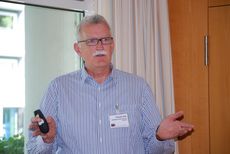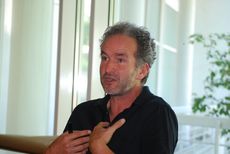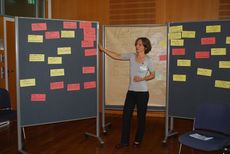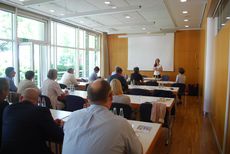Project results from the field of application „sustainable production and consumption of meat“
Results from the first project workshop
The first workshop in the field of sustainable production and consumption of meat took place on 28 June 2015 at the International Management Forums for Gastronomy & Catering. It was organized by Öko-Institut and gv-praxis, an economic journal on communal catering.
The target audience for the workshop „Less meat on the plate – putting the trend into action” was kitchen managers and decision-makers. Participants discussed the major barriers and possible solutions to the reduction of meat consumption in communal catering, and to increasing the availability of attractive, meatless alternatives. The re-design of meals and menus as well as the necessary re-education of personnel were found to pose particularly serious barriers. For example, the selection of easily implemented and attractive recipes represents a current challenge for kitchen chefs. A recipe database, in which successful dishes are identified and rated, could be a possible solution here. Furthermore, it is important to motivate the entire kitchen staff and prepare them for new tasks. Lastly, (continued) education should be improved and expanded to address these elements.
An overview of the results from the workshop can be found here.
The presentations from the workshop are also available:
Ziele und Hintergrund des Forschungsvorhabens Trafo 3.0; Inga Hilbert, Öko-Institut
Best Practice examples:
Klinik Buchinger Wilhelmi GmbH; Hubert Hohler (Bereichleiter Gastronomie)
LWL-Kliniken, Landschaftsverband Westfalen Lippe (LWL); Thomas Voß (stellv. Kaufmännischer Direktor)




Results from the first project workshop at the International Sustainability Transitions Conference on 9. September 2016
The first project workshop took place at the 7. International Sustainability Transitions (IST 2016) Conference in Wuppertal, Germany. As one of several side events, the workshop presented project results, supplemented by additional input from external experts for all three fields of application. An open discussion of the results then took place.
External expert Dr. Ulrike Klöble from the Association for Technology and Structures in Agriculture (KTBL) spoke on the relationship between agriculture and the transformation of meat production.
Presentations from the workshop can be found here:
Agriculture-related issues in the transformation process of meat production, Dr. Ulrike Klöble
Results from the second project workshop on the SustEcon Conference on 25. September 2017
The second project workshop took place at the SustEcon Conference in Berlin, Germany. As part of various side events, the project teams presented their primal results from all the fields of application, supplemented by additional input from external experts. Subsequently, an open discussion of the presented results took place.
On the topic of sustainable meat production and consumption, the project internal expert Dr. Dietlinde Quack (Senior Researcher at Öko-Institute) spoke on understanding & governing the transformation to sustainable meat production & consumption using the Trafo 3.0 heuristic.
The presentation about that can be found here
Results of the final conference of the Trafo 3.0 and evolution2green projects - Transformation2Green: Challenges, pathways and design of socio-ecological transformation processes
Results from the field of application sustainable production and sustainable consumption of meat were presented in a separate workshop. Subsequently the project results were commented by Prof. Dr. Nina Langen and discussed in an open round.
The presentation can be found here:
Ernährungswende: Nachhaltigkeit von Fleischkonsum und –produktion; Dr. Dietlinde Quack, Öko-Institut
The comment can be found here:
Kommentierung der Ergebnisse von Trafo 3.0; Prof. Dr. Nina Langen, TU Berlin
Below, we have compiled the project results from the field of application „sustainable production and consumption of meat“:
- Arbeitspapier: Umweltwirkungen fleischbetonter Ernährungsweisen, eine zusammenfassende Auswertung wissenschaftlicher Studien; Dr. Jenny Teufel, 2018
- Kurzpapier: Der deutsche Export von Fleisch und seine Bedeutung für eine Transformation im Sinne einer nachhaltigen Produktion und eines nachhaltigen Konsums von Fleisch; Dr. Dietlinde Quack; 2019
- Kurzpapier: Die Bedeutung von Fleisch im Lebensmitteleinzelhandel für eine Transformation im Sinne einer nachhaltigen Produktion und eines nachhaltigen Konsums von Fleisch; Dr. Dietlinde Quack; 2019
- Politikpapier: Gestaltung des Strukturwandels in der Schweinefleischproduktion – zur Zukunft von Schweinezucht und Schweinehaltung in Deutschland; Dr. Dietlinde Quack; 2019


